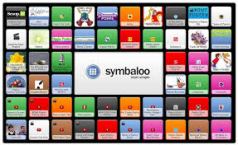I am assisting with our township technology training this week. It is always fun to help other teachers find useful tools that can help engage our students. We are including training with smart notebook, youtube, chromebooks, brainpop, GAFE, Google Drive, and other digital content.
I have introduced Symbaloo to most of the sessions that I have assisted. I love being able to have all of my bookmarks organized in a meaningful and visual manner. I have multiple tabs for personal, school, math blogs, twitter article links, and about 50 other tabs. I am on different computers all day long from my classroom, to the computer lab, and then home. Symbaloo allows me to link all of my bookmarks no matter what computer, web browser, or electronic device. Yes, I even use the Symbaloo app on my iPhone. It is user friendly and there is an ease to create, modify and to move tiles/links.
I have also started uploading and converting my Microsoft Word files into Google Drive/Docs; in hopes that my students will each have Chromebooks. I have been pleasantly surprised how well math expressions written using the equation editor in Word have been converted to the Google Document. Google still needs to do some work on an equation editor… and yes, I know there are extensions and add-ons but Word is still easier. Maybe, because all I have ever known is Microsoft. As of now, I will still create in Microsoft and then convert any docs needed by students.


